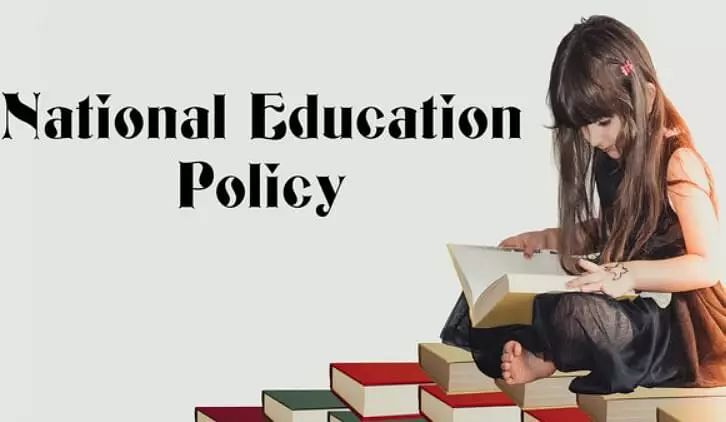
After almost 54 years of first NEP (proposed by Prof, D S Kothari) and 34 years of second NEP, this new NEP (National Education Policy) outlines the priorities of the government and its concern about education and educational causes. It is being discussed and have been discussed a lot already. In this piece, I shall try to put across the salient points in a way that’s easy to understand and also discuss the hurdles in its implementation, the initial focus of which will be on non-financial reforms. In higher education the academic bank of credit will come by December 2020.
Changes in this NEP before and after.
1.Before- RTE till the age of 6-14
After- RTE till the age of 3-18
2.Before- Education budget was 1.7% of the GDP
After- 6% of GDP
3.Before- Except aanganwadi care, there was no emphasis on educating the child before she joined class one.
After- Pre school shall be taken care of with two years education prior to joining class one.
4.Before- No emphasis on teaching in mother tongue till class 5th;
After- Education till class 5th only in regional language or mother tongue. As pedagogical research has established that children learn best if they learn in their mother tongue (or local language) in the primary classes. However, this does not mean that children should not learn English, it only means that English should not be the medium of instruction in the primary years.
5.Before- Strict division between various streams, or between curricular and co-curricular activities, or vocational and non-vocational subjects.
After- they will cease to exist so. Basically, it shall blur the lines between liberal arts and sciences as the modern workplace demands some new-age skills that go beyond the silos created by a ‘technical only’ education or a ‘liberal arts only’ approach.
6.Before- 10+2
Now- 5+3+3+4
( three years of play school, nursery or kindergarten classes combined with grade1 and 2)+3 (comprises grade 3, 4 and 5)+3( comprises grade 6,7 and 8)+ 4 (comprises 9,10, 11 and 12)
Basically the new structure brings into fold the already existing play schools within the ambit of ‘formal education’.So the actual number of years will remain the same with key stage assessments held at Grades 3, 5 and 8. As for the secondary stage, the board examinations would be reformed. They would be made easier where students would be tested on the core capabilities. Instead of just one board, a more modular model to be explored and is expected to be in place by 2022-23.
The 5+3+3+4 structure corresponds to the following:

7.Before- 10th and 12th Boards were high stake examinations.10th especially will have much diluted importance.
After- continuous and comprehensive evaluation instead of stressful board examination. According to many education experts, grading system was the need of the hour to ensure fair and accurate analysis of students’ potential.
8.Before- College (regular streams) admissions through 12th board marks.
After- Students will have to sit for a common entrance exam for admissions( to be worked out by Feb-March 2021) in various colleges. The National Testing Agency (NTA) will conduct the common entrance test. I am not clear though , if the admission in professional courses will also be through these exams or there will a separate exam.
9.Before- Many Single-stream higher education institutions
After- all will move towards becoming multidisciplinary and that includes even IITs and IIMs. ( Lot of people have expressed reservation regarding this particular point. They don’t want the standard of these prime institutions diluted )
10.Before- There existed ‘deemed to be university’, ‘affiliating university’, ‘affiliating technical university’, ‘unitary university’
After- They shall be replaced simply by ‘university’ in a phased manner (as per the proposal, in 15 years or so)
11.Before- Undergrad of 3 years and Masters of two years
After-Undergrad of 4 years ( to be introduced by 2021 for central universities and for others by 22)with one year of extensive research and Masters of one year. Undergrad can be of 3 or 4 years with multiple entry/exit points, ,meaning, if one leaves the study at any point of time, he shall be awarded a certificate/diploma/degree depending on whether one has finished 1/2/3 years of undergrad. They can re-join and continue from where they had left , though I am not clear as to how many maximum number of years can be given to the student to finish the undergrad . The 4-year multidisciplinary Bachelor’s programme shall be the preferred option with a provision for a degree ‘with Research’ if the student completes a rigorous research project. This will especially be beneficial to students seeking education abroad.
12.Before- MPhil required before PhD
After- MPhil being scrapped while PhD can be done after four years bachelors degree!
Besides these, following are some added points
An Academic Bank of Credit (ABC) shall be established which would digitally store the academic credits earned.
Instead of multiple regulatory bodies, only four bodies will Now be working to deal with different aspects of education. Existing regulatory bodies like NCTE, ICAR etc. will act as professional standard-setting bodies.
Multidisciplinary Education and Research Universities, at par with IITs, IIMs will be set up as models of best multidisciplinary education of global standards in the country
Vocational education will be integrated into all school and higher education institutions in a phased manner over the next decade.
More focus on tech-based learning and on creating a solid digital infrastructure which will help to massify education and improve accountability.it will be dedicated towards creating content in Hindi, English and regional languages.
Collaborations between Indian Institutions and their international counterparts will be more streamlines with permission to Indian institutes to set up offshore campuses and allowing the top 100 global universities to set up campuses in India
More focus on improving teachers training institution and employing more teachers in the education system.
MY TAKE ON THE NEP
While I have been researching on the policy, I found a lot of them to be really good in principle, something that looks absolutely the remedy what our education system needs still I can’t help but think if it is only the policy that can change our system. And my answer to this was negative. When we talk of education, we talk of teachers and teachers will be the biggest challenge in this whole new NEP thing.
QUALITY OF TEACHERS, PIVOT OF THIS AMBITIOUS PLAN, IS POOR.
There have been mid-day meals, there has been RTE and better infrastructure but what about the quality of education imparted to the children! The number of teachers is up substantially and the average teachers ratio is closer to the required number. And yet our learning outcome has gone down. So of course, something is grossly wrong with our teachers training and the kind of teachers who are teching our children. To out it simply, there is no quality. There are dubious B.Ed colleges giving away degrees and these teachers are hired then by schools , ticking the box of ‘hiring B.Ed teachers’!
Besides, there are many women ‘teachers’ who are in this profession not because of love of teaching but because it’s convenient and more dangerously ‘it’s better to join a school and earn some pocket money instead of sitting at home’ mentality.
In hinterlands, situation is much worse. There are English teachers in govt schools, who probably can’t even write ‘English’ correctly. These ‘teachers’ had influential relatives helping them pass the relevant and required exams (Remember Ruby Roy, the champion of Prodigal Science aka Political Science). Now imagine these ‘Ruby Roys’ (others not caught so not known) being appointed teachers in those village schools!!!! Indeed, if policies were to solve the problems of the country, they would have been solved long ago.
NOT ENOUGH CONTENT IN REGIONAL LANGUAGES
Teaching and learning material is available in a few standard languages only posing a big challenge to the three language policy. So, investments would be required on more content in most of the languages including the tribal languages.
DEARTH OF TRAINED PERSONNEL
While all these proposals sound innovative and conducive for the growth of a child, there is a severe dearth of trained personnel in the country who can help in its effective implementation. Given that the education providers of today are also the products of the mediocre education system, we need to first put in place a system that will equip knowledge facilitators to understand the nuances of this novel system.
BIASES
Just because, India is not having a great equation with China at present, we can not deprive our children from learning that language, which apparently seems to be the case. While in addition to Indian languages and English, Korean, Japanese, Thai, French, German, Spanish, Portuguese, and Russian are there in the list of foreign languages, an Indian student can opt for under the three language policy, Chinese is conspicuous by its absence. These kind of ‘inwardly’ looking policy may not be healthy. History is another subject that keeps changing with the party that forms the govt in Delhi. To holistically change our dismal education system, we need to overcome these biases.
CONCLUSION
The NEP is ambitious and futuristic but much of its success will depend on how it is executed. During the pre-historical times, India was an abode of the learned and the seekers of knowledge. Universities like Nalanda and Thakshila commanded respect on an international level. May be , with the right implementation of this NEP 2020 we can reclaim the lost glory, even though this may sound ambitious.
Copy@Aradhana Mishra
Sources of my inputs:
Frontline write up Kumkum Roy,
Write up by Kanika Khurana,
TImes Of India,
India today write up by Roshni Chakraborty

